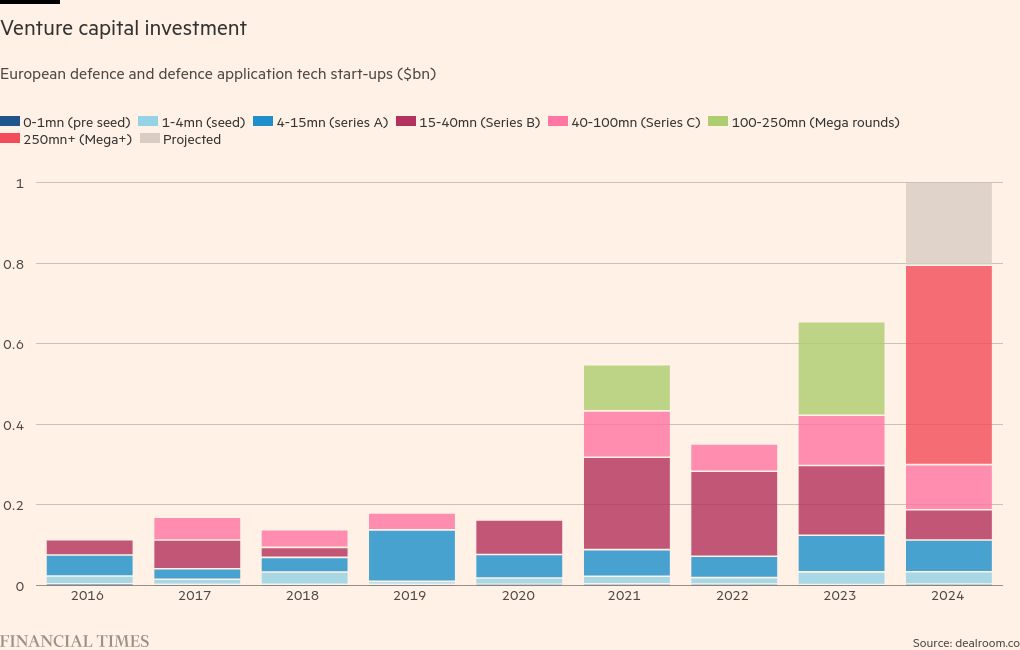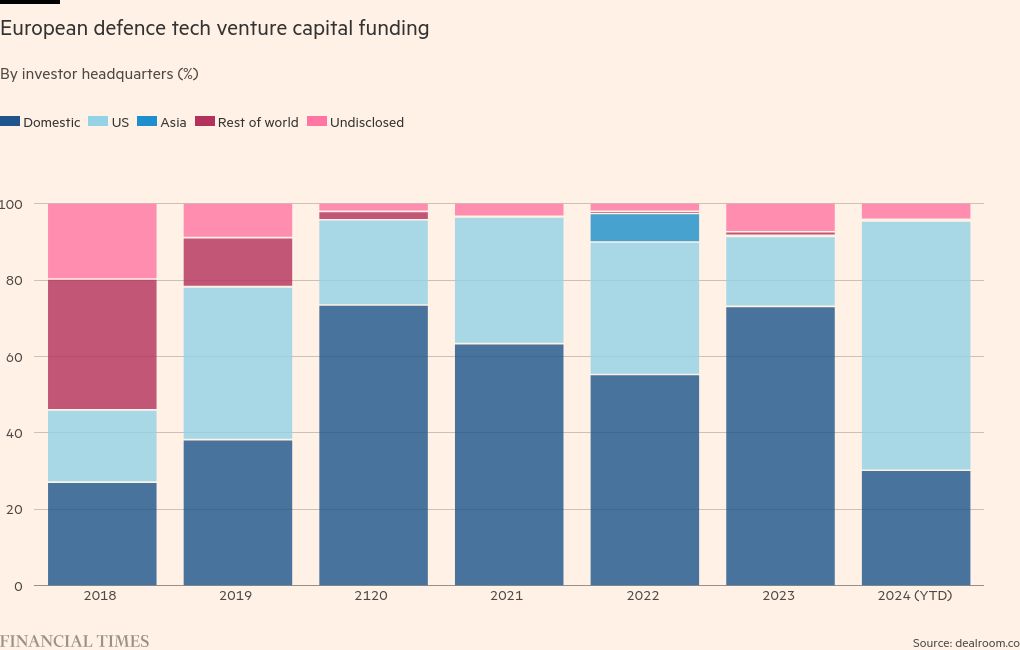Unlock Editor’s Digest for free
FT editor Roula Khalaf selects her favorite stories in this weekly newsletter.
US investors have boosted funding in European defense technology start-ups, accounting for the bulk of private capital flowing into the burgeoning sector this year, amid an increase in global conflicts.
The U.S. has provided more than 65 percent of venture capital defense technology investment in Europe so far this year, according to Dealroom data, up from 18 percent in 2023. The increase marks a sharp reversal from the previous year, when more than half of VC funding for defense technology in Europe came from local investors.
US venture capital firms have offered $458 million to European defense start-ups so far, more than three times the amount invested in any other year, according to Dealroom. Overall, venture capital investment in Europe has increased nearly fivefold since 2018 and is set to reach $1 billion this year.
The largest US-led deal included a €450m fundraising for Helsing in Munich this summer, which was led by General Catalyst and included Accel and Lightspeed Venture Partners.
The growth, said Lorenzo Chiavarini, who heads venture capital and start-up research at Dealroom, was a sign that Europe’s start-up sector was maturing, with some companies raising larger rounds where US investors are more well placed to contribute more.
Venture capitalists, particularly in Europe, have long been wary of backing defense technology companies due to ethical concerns, but that has begun to change since Russia’s February 2022 full-scale invasion of Ukraine.
Although some investors’ concerns about the sector’s environmental, social and governance properties continue to limit investment, entrepreneurs and venture capitalists said there was evidence that more European capital was beginning to flow.
There’s been a “fundamental shift in Europe because of the urgency we’re facing,” according to Khaled Helioui, a partner at Plural, an early-stage investment fund set up two years ago to help European founders develop a range of technologies, including defense. Plural has raised €760 million in two fundraisings, with European investors dominating the second round.
“We really care about Europe’s sovereignty and bringing more industrial power to the continent,” Helioui said.
Alex Kehoe, founder and chief executive of UK start-up Vizgard, which makes AI camera automation software, said access to capital had changed over the past three years. The company’s recent fundraising was not only oversubscribed, it was also much faster than the previous round in 2021. Vizgard has raised more than £1m and “very quickly”, he said.
More investors, Kehoe said, have recognized that there is an “urgent need to fund these emerging technologies,” with a greater focus on “how quickly they need to get into the hands of operators.”
Total venture capital raised in Europe in 2018 for defense technology projects reached $3 billion, according to Dealroom data, with Germany, the United Kingdom and France attracting 87 percent of that capital.

Munich has captured Europe’s largest venture capital funding, led primarily by Helsing, the artificial intelligence-focused start-up seen by some as Europe’s answer to Anduril, the California-based defense technology company. Helsing’s most recent fundraising valued the company at around €4.95 billion.
The defense technology sector now accounts for 1.8% of European venture capital funding. This has tripled since 2022 as the region’s ecosystem has matured.

Despite higher capital flows, industry experts warned that challenges remain for European start-ups.
Nicholas Nelson, partner at MD One Ventures, said it remains doubtful whether a European “Anduril” will emerge, given the fragmented nature of the market, different national requirements and also different views of defense technology in different countries.
“Until there is a set of requirements in these countries, it will be difficult and expensive [for a company] to scale,” he said. “It doesn’t mean you can’t make a European one, but it will be in certain markets.”
Eric Slesinger, founder of 201 Ventures, warned that “equity alone is not the answer.”
Investors, he said, “need to show start-ups that they can help them navigate the additional difficulties of the defense sector — procurement, lobbying, export controls or security talent, for example — in multiple countries and languages.” .
Paul Kwan, managing director at General Catalyst, one of Helsing’s main backers, said Slesinger. “The awareness is high, the capital is there, the innovators are there, but capital is not the same as contracts.
“Everyone is focused on capital, including governments, but . . . what you need to do is start buying modern technologies to support these innovators.”
#funding #boosts #investment #European #military #technology #startups